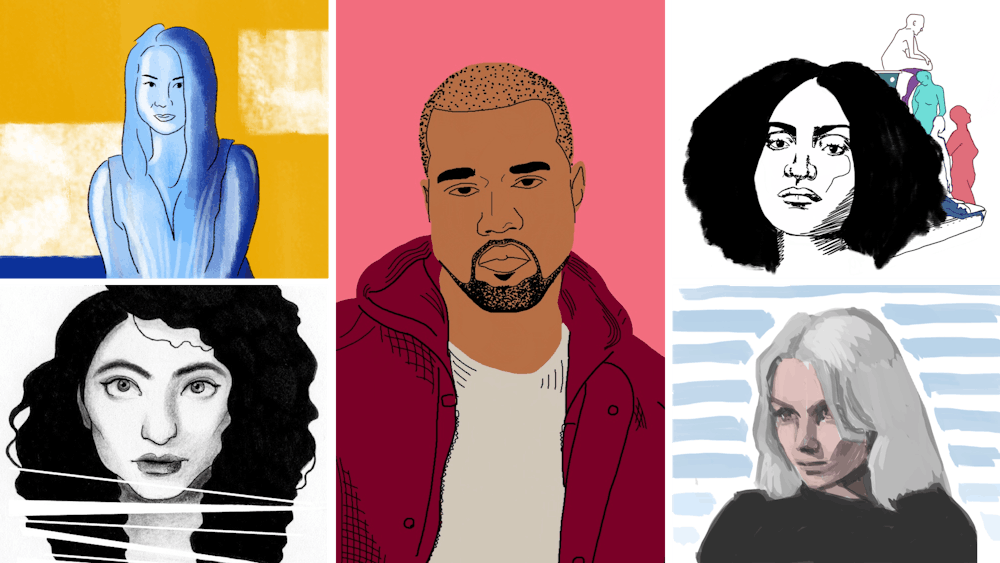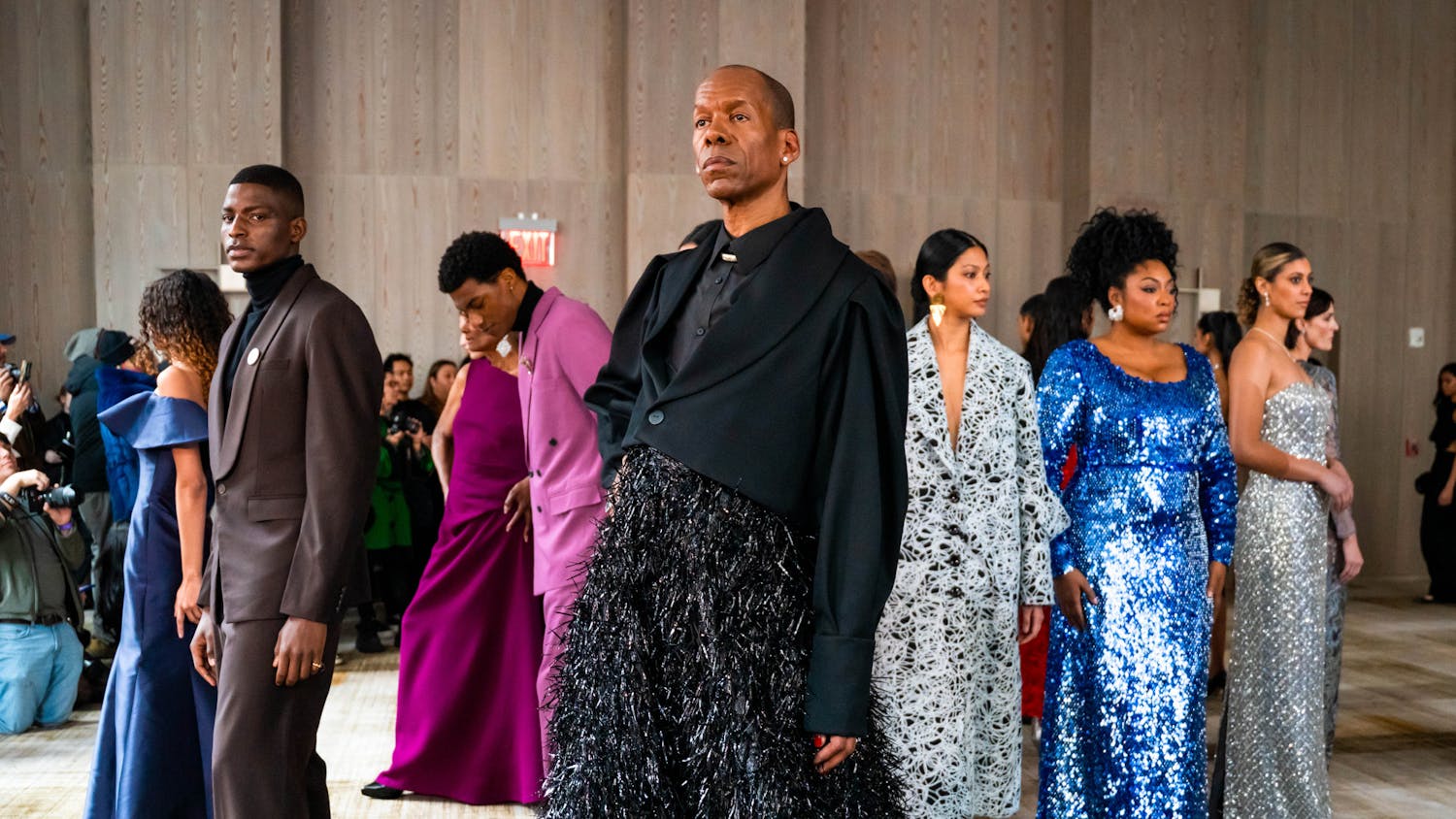This list was compiled from a poll of Street staff's favorite albums of the decade, collected and organized first by artist, then by most popular album. The result was fifteen artists and fifteen albums. We chose to order these albums chronologically, rather than ranking them. These are the albums we came to love this decade—let’s dive in.
My Beautiful Dark Twisted Fantasy (2010) – Kanye West
It’s almost impossible to describe the brilliance of Kanye West’s magnum opus without writing an entire essay. My Beautiful Dark Twisted Fantasy exudes the hallmark perfectionism of West’s career, from its breathtaking production to its biting lyricism. The album takes the listener from the peaks of the rapper’s persona and back over the course of 70 minutes, serving as a meticulously–crafted painting of his psyche. There’s no bad song, no weak feature, no boring bridge—there’s not a single mistake on MBDTF. With such cohesion and clarity of vision, the record remains a masterpiece, even nine years later.
— Arjun Swaminathan, Staff Writer
good kid, m.A.A.d. city (2012) – Kendrick Lamar
As a feat of pure storytelling, Kendrick Lamar’s good kid, m.A.A.d city is unparalleled among records released in the 2010s. Diving into his experiences growing up in Compton, the rapper utilizes complex rhyme schemes and flows while unpacking similarly dense content regarding his upbringing and the obstacles faced by the black community in America. On its own, that makes the album special, but it’s elevated even further by the ambient production that places the listener into Kendrick’s state of mind, from the thumping, stressful “m.A.A.d city” to the drunken vibes of “Swimming Pools.”
— Arjun Swaminathan, Staff Writer
Red (2012) – Taylor Swift
Red showcases what is perhaps Taylor Swift’s greatest talent: her ability to write songs that are personal and specific, yet universally relatable. Dubbed a “canonical coming–of–age album” by NPR, Red encapsulates exactly what it feels like to step into adulthood, all wide–eyed, excited, and easily bruised. Singles like “22” and “We Are Never Getting Back Together” will forever be screamed at birthday parties, while slow burns like “All Too Well” and “The Last Time” drip with regret and fear so tangible they transport even the most hard–hearted of us back to our first heartbreak. Outside of sentimentality, Red foreshadowed today’s Taylor. A solid pop record, she breaks away from the acoustic guitars and twang of her prior releases to experiment with dubstep and dance–pop. But its breadth and depth of genre aren’t what make Red one of the decade’s greatest albums. The real accomplishment is the full–bodied lyricism, which makes the album feel like a world of its own.
— Bea Forman, Style Editor
Pure Heroine (2013) – Lorde
Billie Eilish and King Princess would not exist without Lorde, who was just shy of seventeen years old when her debut album was released. Before her, music for teenage girls belonged largely to the realm of studio executives, who emphasized Auto–Tune, aggressive synth beats, and kid–friendly pop stars. Lorde purposely kept her instrumentation sparse, allowing her words and husky, entrancing voice to take over, and it worked: a single line of “Royals” still inspires listeners to sway in time. Lorde made the music that people like her wanted to hear, rallying cries for the weird girl, and modern music was never the same.
— Melannie Jay, Music Beat Writer
Currents (2015) – Tame Impala
Crafted by Australian multi–instrumentalist Kevin Parker, Tame Impala’s 2015 album Currents ushered in the return of '50s/'60s psychedelic rock to pop music. Over spacey, disco–inspired synths and catchy basslines, Parker explores the process of personal transformation. From the hopeful “Let It Happen” to the enlightenment of “New Person, Same Old Mistakes” and the dread of “Eventually,” Kevin Parker welcomes candid introspection. The album fluctuates between bliss and mourning while maintaining a sound that is undeniably catchy and pleasant. Working solo, Kevin Parker creates a meticulous sound with his vocals and instrumentals, resulting in a cohesive and sublime album.
— Julia Davies, Music Beat Writer
ANTI (2016) – Rihanna
What do you do if you're already a blockbuster pop/R&B artist and fashion mogul with one of the largest fanbases in the world, but have no clear direction for your next album? If you're Rihanna, you hole yourself up in Malibu and start writing one of the best works of your career so far. ANTI, in its resistance to easy categorization, has influenced everyone from Marilyn Manson, who cited “Love on the Brain” as a touchpoint for his last album, to Lorde, who wrote “Liability” after being “moved to tears” by “Higher.” ANTI stands apart from the rest of Rihanna’s discography in its idiosyncrasy, but established her as one of the biggest artists of the decade with its cultural impact.
— Peyton Toups, Music Beat Writer
Lemonade (2016) – Beyoncé
When thinking about music this decade, not mentioning Lemonade feels ridiculous. Its drop was a cultural moment with a capital ‘m’. The sonic cohesion, the production value, the accompanying visual album—the case for Lemonade as the defining album of the decade, resplendent in its rage and packed around a soaring emotional narrative, is an easy one to make. From "Pray You Catch Me" to "Freedom," Beyoncé crafts an album best understood as a cultural artifact, in the context of her marriage, the press scrutiny, and her visuals — remember the yellow dress from the "Sorry" video? The images—and the album as a whole—stick in our collective memory, as indelible as the opening beats of "Formation" drum.
— Annabelle Williams, Editor–in–Chief
Telefone (2016) – Noname
As Noname contemplates quitting the rap game in 2019 for fear her music isn’t reaching black audiences, her debut feels all the more potent. Telefone solidified Noname as more than a coveted feature, sounding like a long daydream. The rapper stretches out each syllable over beats tinged with gospel influence, melding nostalgia with the realities of growing up black and in Chicago. Songs like “Diddy Bop” and “Paradise” paint childhood memories filled with barbecues and mischief. “Casket Pretty” waxes poetic about about gun violence, while “Forever” forms a clear connection between music and Noname’s desire to elevate her community out of a system that breeds poverty and police brutality. Overall, Telefone cemented Noname’s place at the forefront of conscious rap.
— Bea Forman, Style Editor
Blonde (2016) – Frank Ocean
In 2012, Frank Ocean released the critically acclaimed album Channel Orange and quickly got attention for his ability to blend soul, R&B and hip hop to create emotionally vivid, story–like songs. Then, he disappeared from the public eye. Breaking his silence in 2016, Frank Ocean returned with the meditative and confessional album Blonde. Weaving in and out of music genres, the album represented a visionary form of pop from an elusive, new type of pop star. From the candid social commentary on consumerism and police abuse in “Nikes,” to his contemplations on loneliness in “Solo,” Frank Ocean brought to life feelings that have resonated with many. His raw and mesmerizing vocals capture profound pain and longing, yet confer a sense of hope and empathy.
— Julia Davies, Music Beat Writer
CTRL (2017) – SZA
The debut album from SZA, CTRL is an exercise in psychedelic soul as emotionally charged and gloriously reckless as the period in which it was created. SZA has said that, in creating the album, she felt she was accepting a lack of control. CTRL feels like a breath of fresh air for not just SZA herself but for contemporary R&B as well, cutting through the static of most other music released at the time. Two years since its initial release, the album still stands out in today’s sonic landscape. CTRL introduced an exciting new voice in R&B that is best understood when it is experienced, rather than described.
— Peyton Toups, Music Beat Writer
Soft Sounds From Another Planet (2017) – Japanese Breakfast
Nobody embodies the “renaissance woman” in the 21st century like Michelle Zauner, the visionary mind behind Japanese Breakfast. Starting out as a solo artist based around a home recording project, she’s since gone on to become a world class musician (with two albums under her belt and as the soundtrack composer for the video game, Sable), a budding music video director, an accomplished essayist, and soon–to–be author of her own book, Crying in H Mart. Her debut album Psychopomp, was written in the aftermath of her mother’s passing. On Soft Sounds, she looks outward, exploring new lyrical themes and new sounds (from shoegaze to disco), all of which are given the sleek and futuristic air of Japanese Breakfast, while remaining entirely familiar. Fuck “It’s her world, we’re just living in it.” She’s got several worlds, and we’re going for a ride.
— Sam Kesler, Music Editor
Stranger in the Alps (2017) – Phoebe Bridgers
Indie rocker Phoebe Bridgers’ first and only full–length studio album (under her own name; she's in a whole host of other projects, including the indie–rock supergroup boygenius and her collaboration with Conor Oberst) sounds like thin air and humming wind. The melancholic record, with songs that function more like vignettes, benefits from Bridgers' sparse, tight lyricism. And those lyrics, layered on top of plaintive tracks like the standout “Georgia” and the cathartically spiteful “Motion Sickness,” make for a listening experience that both rewards and demands repetition.
— Annabelle Williams, Editor–in–Chief
Be The Cowboy (2018) – Mitski
Mitski’s fifth studio album, Be the Cowboy, is a beautiful paradox. From the meditative yet danceable “Nobody” to the ambitious, angsty “Remember My Name,” every track is filled with sadness and empowering helplessness. Mitski, a classically trained musician, insists that her music is technical rather than emotional, but it's hard to find a song on the album that doesn't evoke some raw visceral feeling. With Be The Cowboy, Mitski takes disparate elements and unites them in ways that make even the most antagonistic ideas into something harmonious. Every note, from the synth–filled opening of “Geyser” to the pseudo–acoustic beats of “Two Slow Dancers,” is tied together through the idea of eternal yearning. Each song speaks of desires that are at once unique and completely universal. It would be nearly impossible to not find some echo of personal truth inside them.
— Keely Douglas, Music Beat Writer
Norman Fucking Rockwell! (2019) – Lana Del Rey
Lana Del Rey’s Norman Fucking Rockwell! drips in the rough–edged melodrama of Americana. It feels like a resurrection of the American dream, a declarative statement in a tumultuous time. On “Venice Bitch” she outlines a love story, complete with images of neighborhood children, a drifting summer, and references to Robert Frost. The deep plunge into the artist’s intimate abrasiveness on “Cinnamon Girl” overlays the project with a sense of revelation. Paired with its transcendent piano melodies and precise lyrical craftsmanship, Lana has not only produced the next best American record, but one that will linger with the listener long after it has concluded.
— Mehek Boparai, Music Beat Writer
Two Hands (2019) – Big Thief
Big Thief was a slow burn this decade—their release of Masterpiece in 2016 was only the spark that ignited their career. Subsequent releases of Capacity in 2017 and UFOF in 2019 prepped us, but Two Hands was the album that finally clicked—the culmination of their chemistry as a band sliding into place. They had arrived. An unhinged performance of “Not” on Colbert, followed by a slew of unconditional praise from outlets from The New Yorker to NPR showed the power of such a reclusive and enigmatic band. The more they unfolded, the less they revealed. But this was not the decade of Big Thief; that’s to come.
— Sam Kesler, Music Editor







